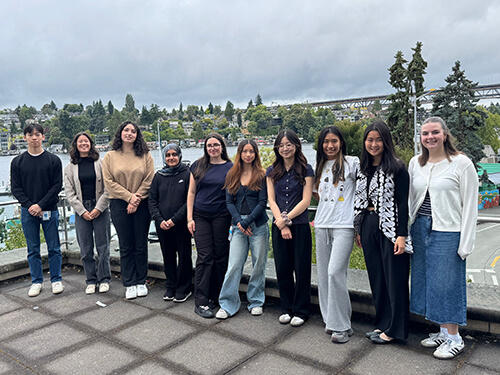Application Guidelines
Thank you for your interest in the SPARQ Program for Summer 2026. Please use this link to submit your application. The link will expire at 5 p.m. Pacific time on Wednesday, January 28, 2026.
 Who Should Apply
Who Should Apply
- Students must be rising second- or third-year students enrolled in a community college or university in the greater Seattle area. Rising fourth-year students and post-baccs are not eligible for the program.
- Students must be able to reside in Seattle or within commuting distance for the duration of the program.
- Students must have an interest in exploring basic, clinical, epidemiological and/or translational science research in pain and neurologic health. Ideally, students will also have an interest in pursuing a graduate or professional degree and/or a future career in health research or healthcare.
- Prior formal research experience is not required.
- Scholars must commit to participating in and attending the entire duration of the nine-week internship program. The full-time program includes a robust, planned curriculum, so it does not allow for time away or vacations. No late starts or early departures can be accommodated.
Step 1: Review eligibility criteria and expectations
Minimum qualifications:
- Must be at least 18 years of age by the start of the program and a U.S. citizen/permanent resident.
- Rising second- or third-year student currently enrolled in an undergraduate, community or technical college, and in good standing with your institution. Applicants currently in graduate school or medical school are not eligible to apply. Rising fourth-year students and post-baccs are also not eligible.
- Must have excellent communication, interpersonal and organizational skills, including attention to detail.
- Must follow all procedures for maintaining confidentiality and protecting privacy of any data or information related to your research projects and clinical observations.
- Must conduct themselves in a manner consistent with our program's values of compassion, excellence, innovation, integrity and collaboration.
Please also review details under “Who Should Apply” above.
Step 2: Review timelines and deadlines
- December 30, 2025: Applications open at 9 a.m. Pacific time for the summer 2026 program.
- January 28, 2026: Applications close at 5 p.m. Pacific time. Late applications will not be accepted.
- January 29–March 13, 2026: Applications will be reviewed.
- Applicants will be notified of selection or rejection by March 13.
- June 15–August 14, 2026: Program duration
- August 13, 2026: Research Poster Symposium
If you'd like to help us spread the word, please do so by posting or sharing our program flyer.
Please note: You will be notified of the status of your application by March 13. Please do not email to inquire as to the status of your application.
Also, please refrain from contacting principal investigators directly and allow the selection and application evaluation process to progress as designed.
Step 3: Prepare before applying
Prepare required documents including resume, personal statement, letter of recommendation and statement of why you want to be considered for a specific project.
- Resume (maximum two pages)
- Name
- Contact information (address, phone number, email)
- College and anticipated year of graduation
- (Anticipated) major; minor (if applicable)
- Any awards and/or honors received
- Any volunteer or work experience
- Any leadership roles
- Relevant skills and strengths
- Personal statement (maximum one page, single-spaced)
- Tell us about yourself and why you are interested in the SPARQ program.
- Describe how you see your role in promoting health and wellness in the communities we serve. Be specific on how you will leverage innovation and collaboration in science and medicine, particularly in pain and neurologic health.
- What are your career goals and how do you think this program will help you achieve these goals?
- What research background do you have, if any? (Note: a lack of research experience will not exclude you from this opportunity.)
- What types of research are you passionate about?
- Letter of reference
- Applicants need to upload one professional letter of reference with their application. Be aware that your reference should be given several weeks to complete the letter.
- Your reference can be a science professor, work supervisor, coach or other mentor. It is not advised to have a friend or family member serve as your professional reference.
- Research project interest statements
- Decide which type of research area from the following most interests you:
- Clinical pain outcomes and epidemiology
- Basic and translational neurosciences
- Pediatric pain research
- Translational pain research
- Community health research in pain and neurologic health
- Once the application cycle opens, you will have the opportunity to review descriptions of each research area and rank your preferences for selection. If selected for the program, we will do our best to match you with a mentor from your #1 or #2 research area.
- Decide which type of research area from the following most interests you:
Step 4: Apply
Complete and submit your application, including all required documents above, during the application period: Tuesday, December 30, 2025 (9 a.m. Pacific time), through Wednesday, January 28th, 2026 (5 p.m. Pacific time). Late applications will not be considered.
Step 5: Offers
Selected students will receive offers from Seattle Children’s by March 13, 2026, and after accepting, start the preboarding and hiring process prior to the June start date.
Questions?
If you have any questions or concerns, please email Sophia Mun.
